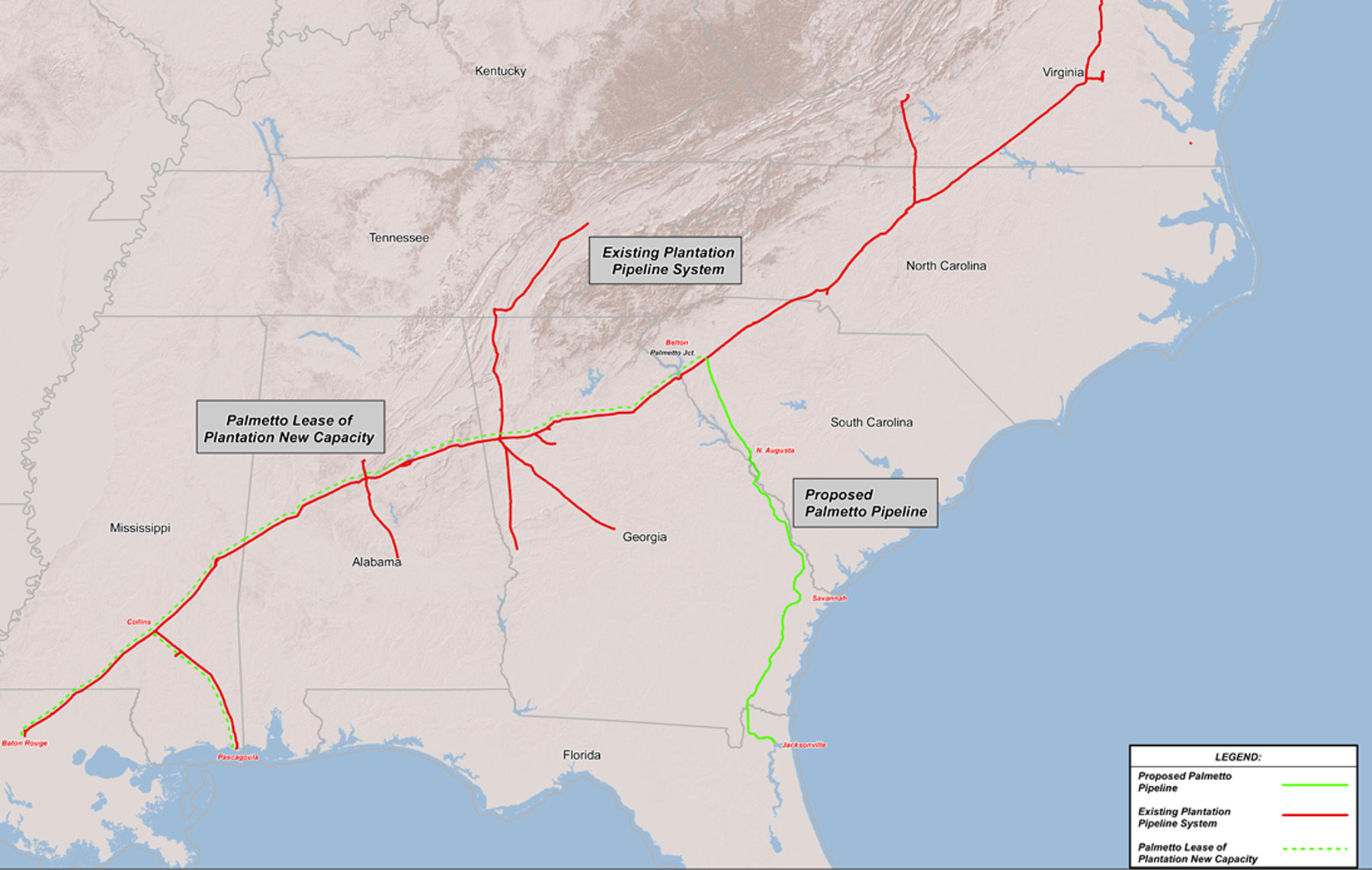On June 17, Kinder Morgan, the third largest energy company in North America, filed a petition challenging the Georgia Department of Transportation’s (GDOT) ruling forbidding the company from using eminent domain to take private property from homeowners for its Palmetto Pipeline project without explicit permission. Without eminent domain, Kinder Morgan must negotiate purchase deals with individual landowners. The company’s appeal claims that the decision infringed on the company’s rights by violating state law and that the GDOT exceeded its statutory authority.
Many timberland owners have raised concerns about the impact of the project on their ability to manage timberland investments while having sufficient, easy access to their property for recreation and other purposes. GFA sent a letter to GDOT State Utility Engineer Mike Bolden on May 14, urging GDOT to consider the Association’s policy guidelines on private property rights and eminent domain in its deliberation and decision regarding the pipeline.
“The Association’s clear policy guidelines for private property rights and eminent domain oppose any efforts to restrict or encumber private forestlands without fair compensation,” GFA President Steve McWilliams said. “Ultimately, landowners should be compensated for the value of their land and the timber resources on the land using both current and future values.”
The proposed pipeline would enable refined petroleum products such as gasoline, diesel fuel, jet fuel and ethanol to be transported from Baton Rouge, Louisiana; Collins and Pascagoula, Mississippi; and Belton, South Carolina; to North Augusta, South Carolina; Savannah, Georgia; and Jacksonville, Florida. According to Kinder Morgan, the pipeline would stretch 200 miles across 12 Georgia counties. The proposed Palmetto Pipeline would carry 150,000 barrels per day (bpd), with an ultimate capacity of 167,000 bpd.
[wptabs type=”accordion” mode=”horizontal”]
[wptabtitle]View the Poposed Pipeline Route[/wptabtitle] [wptabcontent]

The map shows the proposed Palmetto Pipeline in green. Map courtesy of Kinder Morgan. The Proposed Palmetto Pipeline would go through the following counties in Georgia:
- Richmond County: 2 miles
- Burke County: 25 miles
- Screven County: 34 miles in
- Effingham County: 39 miles
- Chatham County: 2 miles
- Bryan County: 7 miles
- Liberty County: 18 miles
- Long County: 2 miles
- McIntosh County: 17 miles
- Glynn County: 24 miles
- Camden County: 18 miles
- Charlton County: 12 miles
[/wptabcontent]
[/wptabs]
“We are disappointed with the outcome of our proceedings with the Georgia DOT. We believe that we have more than adequately demonstrated that this project is in the best interests of Georgia’s consumers, as it will result in lower costs and provide safer transportation of refined petroleum products to many areas in the Southeast, including specifically many communities in Georgia,” said Kinder Morgan Products Pipelines President Ron McClain in a statement following the decision.
On behalf of the Savannah, Ogeechee, Altamaha and Satila Riverkeepers and the Center for a Sustainable Coast, GreenLaw, an environmental law firm based in Atlanta, filed a “motion to intervene” on July 28 in Kinder Morgan’s lawsuit, in order to ensure that the group’s interests are adequately protected.
To learn more about the Palmetto Pipeline, visit: http://palmettopipelinefacts.com/.
[wptabs type=”accordion” mode=”horizontal”]
[wptabtitle]Sabal Trail Pipeline Undeterred[/wptabtitle] [wptabcontent]
While the construction Kinder Morgan’s petroleum pipeline has halted, the natural gas Sabal Trail Pipeline, a joint venture Spectra Energy Corp, NextEra Energy, Inc. and Duke Energy, is on schedule to begin construction in June 2016 and to complete the project in May 2017.
The Sabal Trail Pipeline, which will stretch 162 miles across nine Georgia counties, was given authority to proceed by the Federal Energy Regulatory Commission (FERC), a federal agency with preemptive authority to approve interstate natural gas pipelines.
Once a final route is fixed, Sabal Trail must secure legal permission to cross private parcels of land along the route. The company will do so either by entering in to voluntary contractual relationships with landowners or through the power of eminent domain, which is conferred to interstate natural gas pipelines upon FERC approval – rather than GDOT.
The pipeline has faced opposition from residents and homeowners who have expressed concern about the safety of the pipeline and the potential noise pollution from the construction of a compressor station.
To learn more about the Sabal Trail Pipeline, visit: http://www.sabaltrailtransmission.com/.
[/wptabcontent]
[wptabtitle]Eminent Domain Tips for the Forest Landowner[/wptabtitle] [wptabcontent]
Though the Sabal Trail Pipeline and the Palmetto Pipeline Project are garnering the most attention in the media surrounding eminent domain, landowners may face many different types of eminent domain situations with local utility companies or government agencies that will take private property for public use, with payment of compensation.
Forest landowners should carefully consider their long-term investments in timberland in these situations. Here are some tips to consider when facing land acquisition by a condemning authority:
- How did the condemning authority arrive at its offer amount (i.e., its value determination)? Request a written summary of the appraiser’s valuation.
- Request a drawing or map identifying the land being acquired. Is the location of the land being acquired established or is the location subject to change?
- Is the land going to be owned by the condemning authority, or is it acquiring a permanent easement and/or a temporary easement?
- What use limitations will the landowner be subject to with regard to land being acquired?
- Did the landowner have any plans to use his/her land for any particular purpose? If so, will the acquisition impact the future planned use?
- What impact will the loss of land have on the value of the remaining land?
- If the land being acquired does not abut a public road, how will the condemning authority gain access to the land being acquired, and is the landowner being compensated for that access right?
- Most of all, contact an attorney and a local appraiser with expertise in condemnation law. This is a complicated area of the law with many pitfalls for the unwary landowner.
[/wptabcontent]
[/wptabs]

